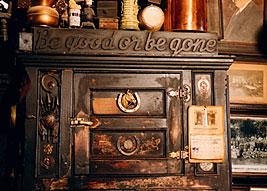 The cigarette smoke in bars used to be overwhelming for me. Before smoking was banned (locally), a trip to a watering hole for a drink with friends used to be quite disgusting. My eyes would burn. My throat would hurt. My voice would sound hoarse and leathery by the end of the night, and even the food and drink tasted as if it were lightly seasoned with tar. My clothes would stink so much that I upon returning home I would have to hang them up on the outside furniture to air out overnight. In my college days, weekends spent at bars were often followed by weekdays of sinusitis. I resented the crowds with their destructive exhalation of smoke into my lungs so much that I stopped going completely (not really, but that sounds righteous). And for a man who enjoys a good beer with conversation, this was tragic.
The cigarette smoke in bars used to be overwhelming for me. Before smoking was banned (locally), a trip to a watering hole for a drink with friends used to be quite disgusting. My eyes would burn. My throat would hurt. My voice would sound hoarse and leathery by the end of the night, and even the food and drink tasted as if it were lightly seasoned with tar. My clothes would stink so much that I upon returning home I would have to hang them up on the outside furniture to air out overnight. In my college days, weekends spent at bars were often followed by weekdays of sinusitis. I resented the crowds with their destructive exhalation of smoke into my lungs so much that I stopped going completely (not really, but that sounds righteous). And for a man who enjoys a good beer with conversation, this was tragic.
When the local smoking ban was proposed there were predictable outcries from business owners who feared that a restriction of their patrons’ rights to inhale burning cigarettes would lead to financial ruin. Some complained about a government intrusion on personal freedom, even as these same folks ignored their own intrusions upon the freedom of the air we are obligated to share. Still others privately worried about gaining weight from smoking cessation. But finally a ban passed, and then another, and another, and I was able to enjoy the bar atmosphere as well as the cold, preferably craft beer in my hand once again. No more respiratory problems, stinking clothes, or carcinogenic ambience.
Recently some amazing health evidence has surfaced since the advent of smoking bans:
Bans on smoking in public places have had a bigger impact on preventing heart attacks than ever expected, data shows. Smoking bans cut the number of heart attacks in Europe and North America by up to a third, two studies report… the results of numerous different studies collectively involving millions of people, indicated that smoking bans have reduced heart attack rates by as much as 26% per year.
Second-hand smoke is thought to increase the chances of a heart attack by making the blood more prone to clotting, reducing levels of beneficial “good” cholesterol, and raising the risk of dangerous heart rhythms.
It makes you wonder what savings we could achieve in the health care budget if people no longer smoked first hand, and what personal tolls of misery could be prevented in terms of suffering from cancers, obstructive pulmonary disease, and cardiovascular disease. A 26% decrease in heart attacks. That is astounding. How much money would we need to spend on pills taken daily by the entire country to effect that same reduction? Surely it would be in the billions.
So what if we no longer had to breathe in the combustion products of oil? What if guns were banned? Motorcycle helmets made mandatory? High fructose corn syrup and highly processed fast food strictly limited in our diet? Tanning beds discouraged? Kanye West silenced? The list could go on, with varying ideologies becoming increasingly piqued (go ahead and add your gripe)… but putting our freedom of questionably bad choices aside, and simply considering health and wellness, so much could be done to improve the petri dish in which we must all coexist.
But if you live in an area with a smoking ban, at least you can taste a good beer again, with less ambient harm and smelliness, and just maybe you won’t have that heart attack you might have had during some awful day in the future.

No one ever knew how much healthier smoking outdoors actually is.
Observation #1: I am sceptical about these early reports of obvious benefit from the appearance of no-smoking restaurants and at other public venues. While I have every expectation that banning smoking is beneficial to public health, it stretches my imagination that it might come so quickly.
Observation #2: In spite of Observation #1, it is good to know that we do not see smokers convulsing on the floor of restaurants, suffering from nicotine withdrawal, and that we do not see wholescale closing of restaurants due to the inability of people to smoke while they eat.